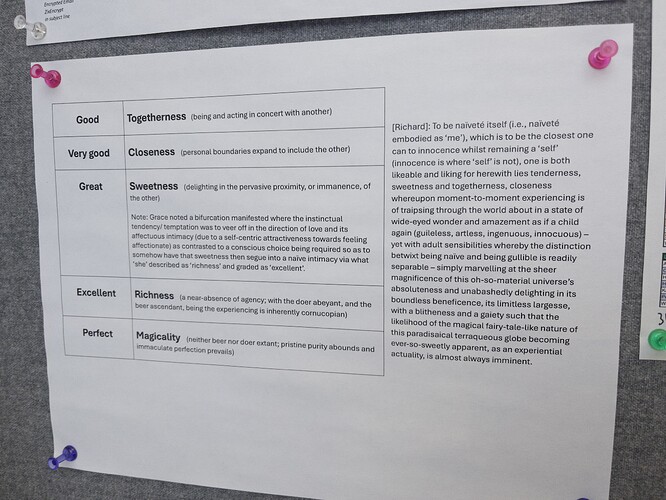Henry: I had an interesting time over the weekend meeting up with a couple of friends and going for a long hike, one of them was extremely concerned about the potential nazi affiliations/ sympathies of the new American president, and was explaining how he believed that things were going to go downhill fast and that we would soon have a fully fascist regime.
For some reason I couldn’t fully explicate I don’t share his concerns.
However, I could also see that the discussion wasn’t settled for me, as I kept on chewing it. It eventually became clear that though I didn’t agree with his prediction, his fears about it were contagious, which made it clear that there was some ‘hook’ in me. After thinking about the issue via different avenues for a few days, I recalled that Richard had an article about peasant mentality which I had read only once and which I thought would touch on relevant aspects, so I decided to read it again.
Hi Henry,
You report being affected by your friend’s psychic vibes of “contagious” fear regarding “new American president”. You could start by checking out some of the facts for yourself. The topic fits in well what Richard writes in the article about peasant mentality (more here and here) and the interesting thing is that this recent presidential election can be regarded as the revolution of the generally obliging and subservient peasant population after circumstances became so severe that it drove them to the brink of threatening their very survival.
I haven’t watched current affairs in the last 7 months but before that Richard and myself were regularly keeping abreast of most of what was going on in the US and the world at large.
In summary, the actions of the previous government had, by statist intervention, doubled the fuel and electricity prices, tripled the food prices, restricted gas-stoves and cars to be replaced with electric vehicles, and instituted a myriad other public-servant-inspired restrictions on affordable living with so-called climate-change regulations based on the world-wide global warming scare. Additionally the privacy of girls’ toilets and locker-rooms were violated by legal decrees for confused males to use them, by instituting edicts that interfered in parents’ rights to choose schools and gender for their children. They also inflicted a world-wide plague on Western and other countries together with insulating/isolating the whole population plus an obligatory, inefficient, even dangerous, genetic experimental drug (deceitfully called ‘vaccine’). On top of it they engineered an invasion of millions of “aliens” into the US resulting in more poverty and crime for large afflicted regions. All these events quite transparently benefitted the already obscenely rich and brought more misery to the middle-class and poorer population.
Even though the majority of the media is owned and controlled by the very same obscenely rich, their scare-tactic of “potential nazi affiliations/ sympathies” seems no longer be effective – it has been used too long without tangible evidence.
Henry: The most salient point I have taken from it so far (I’m about halfway through the entire article as of writing this post) is that we have already been screwed by various elites throughout history, going back to agrarian society and throughout time various systems of laws have served only to entrench said screwing. Meanwhile, the psychic influence of peasant mentality resulted in an entire class of people who were effectively defending their captors leading to a state of denial and confusion among the general population.
You can put it that way as if the elites were the evil perpetrators and the compliant citizens were blameless victims – however, there is a lot more to peasant mentality such as the recently discussed cognitive dissonance (link) and the instinctual need to belong. Plus there is the (instinctual) need for superiority and control, which is activated as soon as opportunity arises. What I find most astounding to observe is the tendency of everyone to rather fight each other than address the cause of whatever problem presents itself.
Just like an inexperienced actualist will first blame themselves, or blames others for unwanted aspects of the human condition before sensibly making use of the practical solution of the actualism method as intended (just found this link, lol). It is certainly worthwhile to continue contemplating the various aspect of peasant mentality when you have the inclination and opportunity as it governs most of social life and as such your own life when undetected.
Henry: So that immediately settled a large aspect of the question for me: we are already being screwed, with the difference mainly being one of degree rather than of whether it is happening or not. Further, our ability to do much about it as an individual is severely limited, especially as one’s effectiveness at pushing back directly correlates with the danger one is putting oneself in. Furthermore any successes ultimate prove pyrrhic in the face of the deep instinctive forces which drive the fascist/ authoritarianist power dynamics.
It’s interesting that you only name one side of the political dichotomy but not the sinistral statist ideology. Is there a blind spot to recognize the same “instinctive forces” operating on the both sides? After all, the human condition ‘distributes’ instinctual passions to all human beings.
Henry: Richard’s solution is simple: despite the factual disfranchisement, once one is free of the feeling of disfranchisement, a ‘remarkable freedom’ eventuates – with no need to rebel.
I found this understanding to be more than satisfactory to satisfy myself re: the present political situation in my country. It doesn’t release me from knowing what will happen next, but it doesn’t matter – I can’t prepare for all ends anyway. […]
At the same time, I appreciate that this does not involve sweeping such misdeeds and tragedies under the rug – they have been and continue to be abominations.
What exact events are you referring to when you say “misdeeds and tragedies”, “abominations”, which you do not want to sweep “under the rug”? Just curious.
Henry: Finally, this approach is proving an extremely useful lens to see my personal primary bugbear through – the feeling of feeling disfranchised of a desirable mate.
It is no secret that economic and social status tend to be significant factors in mate selection, and the revelation that I have been blaming myself for both (a la peasant mentality) and not recognizing that the system is set up to enrich only a small proportion of the population and that by definition the bulk must be seen as ‘undesirable,’ with an extremely limited and statistically unlikely capacity to change that condition (at least as regards that top 10%, top 5%, or top 1%), meanwhile blaming that 90%/95%/99% for their condition. […]
As I understand it, the interpretation/ explanation for your failure to find a “desirable mate” is to first blaming yourself (which is silly) then blaming the economical system (which is equally silly). Instead you could accept the fact that the only person you can change is yourself. Why, for instance, do you define yourself, and thus a potential “desirable mate” by economic class? There is an obvious social conditioning in action.
Henry: As always I welcome any critiques or observations! This topic has long been a weighty one for me and as such there are likely to be things I got wrong in my passion. At this moment I feel quite light about the whole situation though – a most delightful turn of events. (link)
Given that you asked, my observation is, that the language/the way you are talking to yourself and others and thinking about yourself, is quite generalized, sophisticated and thus detached, as if you keep yourself and what is viscerally and emotionally happening for you at arm’s length.
Once you recognize and accept that you are your feelings instead of having feelings (and analysing them) you will be able, with fascinated attentiveness, to change the feeling you are. There may be a fear of feeling the feeling you experience at first but if you are aware enough not to resist experiencing the feeling (every resistance is feeding the feeling) and accept that it is happening, you will find that it instantly loses a great deal of its strength.
You can even go a step further, with personal honesty and sincerity, and reawaken your dormant naiveté (be like a child again with adult sensibilities). This naïve attitude allows you to like yourself and others and regard people (including yourself) as fellow human beings, not as scientific, or pseudo-scientific, objects of your logical observations.
Try it out – it is quite magical when you do.
Cheers Vineeto
![]()
![]()
![]()





